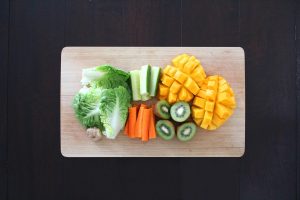1 – Weight loss/gain comes down to 1 key equation
With so many products and companies working to promote their particular brand of weight loss product, or ‘new amazing diet with guaranteed results’ there are a lot of conflicting and difficult to understand messages surrounding nutrition. The atkins diet, the human being diet, going ‘keto’ or ‘paleo’, low carb, low fat (even the cabbage soup diet) etc. all work by following this one, simple equation:
[Energy in] – [Energy out] = Changes in body stores (particularly body fat).
When you take in more energy in the form of calories than you use in a day, you gain weight.
When you take in less energy than you use, you lose weight.
If you consume the same energy as you use, you will maintain your body weight.
To reduce calories in:
- Use hand portions or a calorie tracker to guide portions
- Consume enough protein to reduce hunger cues
- Eat slowly to notice and recognise hunger and fullness signals
- Eat to ‘80% full’, so you are satisfied and not stuffed.
- Eat lots of vegetables!
To increase calories out:
- Increase the amount of exercise you do – particularly strength training.
- Increase your daily activity – take the stairs, walk to work or park further away from the shop.
- Practice some form of self-care to reduce your stress and improve sleep
A combination of 1, 2 or several of these things will tip the scales of energy balance towards lower energy intake and higher energy output, resulting in a reduction of body fat.
2 – Protein is king, second to calories
Protein is the most important macronutrient to get right, after consuming the correct number of calories for your goals; this is for 2 reasons.
Firstly, it helps you feel fuller – protein takes longer to digest which means you feel fuller for longer.
Secondly it helps build and maintain muscle, which is what most people are trying to achieve with training and their diet.
These are both equally important reasons to ensure you get enough protein, with the recommendations being anywhere between 1.6g per kg of bodyweight, all the way up to 2g per kg body weight.
Someone who is just looking to get a bit leaner whilst losing some body fat will be aiming for the bottom end of the recommendation, but a high protein diet has been shown to maximise muscle protein synthesis which should mean more strength and muscle gain for those consuming enough calories. This means that a diet higher in protein is better for improving body composition.
3 – More processed = less nutrients
If you are trying to lose some weight, improve your body composition, gain some muscle or simply trying to optimise your health, consuming a diet that consists mostly of whole, single ingredient foods seems to be the best way of achieving this.
Minimally processed foods such as grains, nuts, vegetables, fish and lean meat contain a wide range of vitamins, minerals, and nutrients essential for our body to function normally. In general, we are healthier when we consume more whole foods and fewer refined ones.
The more processed a food is the less nutritional value it has, meaning less fibre, less vitamins and minerals, less essential fatty acids and less phyto or zoonutrients (plant and animal nutrients). It also usually means it will have gained additives, fillers, preservatives, increased amounts of sugar and sodium, increased fat and refined starch.
Minimally processed food are also rich in fiber and protein, which we know are two nutrients that help increase satiety, leaving us with that satisfied feeling for longer meaning we tend to eat less. They also tend to have fewer calories than highly processed food. These two traits alone make it a lot easier to control the amount you eat, making it far easier to control our weight. When talking about how processed a food is, it isn’t as simple as ‘whole’ and ‘not whole’. Rather than separating them into those two distinct groups, we can view them as being on a spectrum. For example
Less processed > highly processed
Grains: brown rice – white rice – rice cereal
Fruit: Apple – Apple juice – apple fruit cake
Nuts: Peanuts – peanut butter – peanut butter cookies
Consuming some of these more processed foods won’t have a dramatic impact on your overall health, but as food gets further down the processed spectrum it loses a little bit of its nutritional value. If the majority of food you eat sits on the highly processed side, you are missing out on the potential benefits of that food group before processing and gaining a lot more calories in the process. The idea is not to be ‘perfect’ with your choices, but to focus instead on making your choices just a bit better.
4 – Fruit/veg help you lose weight and reduce disease risk
Of the different types of whole foods, fruit and vegetables really deserve a special mention. They are loaded with antioxidants, vitamins, minerals, fiber and phytonutrients all of which promote improved health. A diet rich in antioxidants and anti-inflammatory foods such as fruit and veg can lower the risk of developing disease and by increasing our intake of these foods, we could avoid up to 20% or more of all cancer cases.
These wonder foods also help boost cognitive performance, beating any supplement available on the market. Aside from this, fruit and veg also have high volume with relatively low calorie density. For example, a whole head of broccoli has only about 150 calories, for an impressive portion of food for one person to eat. This means that for a small amount of calories you can eat a generous portion, keeping you feeling full whilst not extracting a large number of calories – ideal if you are trying to control your energy intake.
So what does a diet rich in fruit and veg look like? There is one simple rule to follow that will help cover all bases: Eat the rainbow! Fruit and veg come in all shapes, sizes, but more importantly colours. The colour of a fruit or vegetable can tell you a lot about its health promoting properties; Carotenoids have been shown to decrease the risk of disease, particularly certain cancers and eye problems and are found in orange to red fruits and veg. Anthocyanins are flavonoids responsible for purple and blue colours in berries and have potent anti-viral and anti-carcinogenic properties.
So to truly appreciate the variety of protective and health promoting benefits the best advice is to eat the rainbow, eat fruit and veg of different colours, with 5-7 servings a day.
5 – Sleep is important!
How much you sleep plays a bigger role than you might think on your nutrition habits. If you only get 5 or 6 hours of sleep when really you need 7 or 8, you will be keeping your body in a state of chronic sleep deprivation. This dramatically affects your body’s ability to regulate several key hormones.
Ghrelin levels rise – this triggers hunger cues
Endocannabinoids increase – this makes your perception of foods seem even more pleasurable
Leptin falls – this is your satiety hormone, meaning it takes longer to feel full up.
Our body attempts to make up for the lack of energy by consuming things high in glucose, the combination of these things makes you hungrier, increases your cravings for sweet things and means you are far more likely to overeat than normal!
Being tired also means that you move less and are less motivated to exercise. More time awake also means more time available to continue over-consuming. Research has shown that people who are sleep deprive tend to eat at least 300 more daily calorie than those who got a full night’s sleep.
Based on these 5 principles, can you claim or name any people who you know are consistently doing all of these things well?
- Eating the right number of calories for their body and goals
- Consuming enough protein to support muscle growth/weight loss
- Choosing mostly whole foods
- Eating the rainbow
- Sleeping enough
These might seem simple and common sense, but following these basic principles will get the majority of people results most of the time. These principles are the foundation upon which more advanced body composition goals are built upon, but by doing these things well, consistently you can guarantee that most people will see an improvement in energy levels, motivation and and improvement in their body composition.
– Coach Kyle




